Dear Mr President, stop blue-ticking our democratic order!
General Mkhwanazi laid out what amounted to, at face value, a damning indictment of Senzo Mchunu, his predecessor Bheki Cele, and several senior police officials.
I was fortunate to have been guided by an eclectic ensemble of father figures throughout both my formative and later years. Among the most influential and memorable was my late uncle, Abe Morolong — a skilled curtain rail fitter whose moral example and handiwork continues to adorn many homes from Gauteng to Gaborone I still find myself visiting from time to time.
One particular anecdote he often recounted remains etched in my memory. It was a self-deprecating tale he liked to share with us, especially during long road trips, such as when we would travel to visit my then exiled family in Botswana during the turbulent 1980s.
In stressing the importance of communication and decisiveness in a matrimonial union, Uncle Abe would tell the story of a day he arrived home while my late aunt Salome — an early riser — was already asleep. Not wanting to wake her, he left a note on her bedside table asking her to wake him up early the next morning, as he had a critical out-of-town curtain rail installation to attend.
The only complication was that they were, at the time, not on speaking terms following a disagreement. As a result, Aunt Salome, maintaining the silent standoff, responded in kind — by also leaving a “Please wake up, Abe” note on his side of the bed before heading to work at dawn.
The humour was not lost on any of us, but the lesson was profound: even in silence, we communicate — and sometimes, to our own detriment. Needless to say, from that day forward, Uncle Abe, having learned a costly lesson after missing the assignment, made it a point to maintain open lines of communication with my aunt — regardless of how serious their disagreements might have been.
In recent months, that life lesson resurfaced vividly in my mind as I came across reports detailing the silent treatment President Cyril Ramaphosa gave to former deputy finance minister Andrew Whitfield. Whitfield had written to the President, seeking permission to accompany his political party colleagues on an ill-advised lobbying trip to Washington. But unlike my Uncle Abe, who at least received the courtesy of a note from his wife amid their silent standoff, Whitfield — whose party, the Democratic Alliance (DA), is in a polygamous governing union with Ramaphosa’s African National Congress (ANC) — received no response whatsoever. Not a word. Just silence.
In a moment charged with indignation — one that carried the tone of a Rubicon being crossed in the uneasy, polygamous coalition — DA leader John Steenhuisen issued an ultimatum to Ramaphosa: fire venal ANC cabinet ministers, or face a seismic political announcement. For a brief moment, it seemed the DA was prepared to draw a hard line.
But when the dust settled, the party’s response bore the familiar contours of a partner trapped in a dysfunctional relationship — one showing symptoms not unlike political Stockholm Syndrome. True to its word and nature, after Ramaphosa called its bluff, the DA made its “seismic” announcement: it reaffirmed its commitment to the union, while simultaneously declaring that it would boycott Ramaphosa’s upcoming National Dialogue gathering. The drama, it appeared, would continue — just not at the President’s shindig.
The National Dialogue is billed — some might say optimistically — as an opportunity for South Africans from all walks of life to come together and help shape the next chapter of our democracy, though many remain unconvinced about its substance or sincerity.
The credibility of the National Dialogue and the Government of National Union have been thrown into serious doubt, particularly in light of the DA’s ambiguous ultimatum and its demand for Andrew Whitfield’s reinstatement. That demand is cast in an even more revealing light when one considers the ANC’s long-standing tolerance — if not tacit endorsement — of a cabinet teeming with individuals whose names are synonymous with venality and ethical compromise. The dissonance is striking: while Whitfield’s exclusion prompted a dramatic outcry, the ANC continues to elevate and retain ministers and deputies who, by any reasonable standard, would struggle to pass even the most basic integrity test.
The DA’s point was underscored by the graft allegations levelled against Police Minister Senzo Mchunu during last weekend’s explosive media briefing by KwaZulu-Natal Provincial Commissioner Lieutenant General Nhlanhla Mkhwanazi. Mkhwanazi laid out what amounted to, at face value, a damning indictment of Mchunu, his predecessor Bheki Cele, and several senior police officials.
Mkhwanazi not only painted a picture of a corrupt and rotten core at the helm of the police service, but also exposed a force riven by internal conflict — one seemingly more preoccupied with infighting and pursuit of ill-gotten personal opulence than with confronting the marauding criminal networks operating with apparent impunity.
With each dawn breaking through the morning dew, new reports emerge — blaring across radio waves, flashing on television screens, and flooding social media platforms — of fresh arrests involving corrupt police officials and politically connected tenderpreneurs. All too often, these grim revelations are punctuated by reports of the brutal and senseless murders of patriotic, principled compatriots — men and women who dared to shine a light on public malfeasance. Their only transgression: refusing to look away in the face of wrongdoing. In exposing corruption, they paid the ultimate price, becoming martyrs of integrity in a nation still struggling to protect its most courageous truth-tellers.
The steady drumbeat of these revelations paints a sobering picture of a state grappling with institutional decay, where the rot runs deep and accountability remains elusive.
Incidentally, and counterintuitively, the DA’s rejection of the National Dialogue finds resonance from hitherto unfathomable quarters: those demanding an end to endemic crime and corruption within the police system, particularly in crime intelligence.
They argue, with increasing urgency, that rampant crime and corruption are not isolated afflictions but lie at the very nexus of our country’s deepening economic, social, and political malaise. These forces do not merely undermine public trust — they actively erode the foundations of development and democratic consolidation. Our potential for inclusive economic growth, they further contend, is inextricably linked to our willingness to confront — and dismantle — the unholy quartet of crime, corruption, avarice, and moral decay. Until we deal decisively with these modern-day horsemen, South Africa’s promise will remain perpetually deferred.
To that end, I earnestly appeal: Dear Mr President, stop blue-ticking our democratic order - or leaving empty rhetoric notes on this troubled nation’s bedside.
If the events of this past Sunday do not amount to a clarion call for national reckoning, then, at the very least, they underscore our desperate need for a present, decisive father figure — someone courageous, principled, and unflinching in the face of adversity. A leader not swayed by political expediency, but driven by a deep moral conviction to restore integrity to our public life. Someone not unlike the stoic, upright General who, against formidable odds and at great personal risk, continues to stand firm — so that this fragile union might endure, heal, and be given a genuine chance to flourish.






